Sean Jacobs's Blog, page 232
February 11, 2019
We know from political crises in Africa that foreign intervention is a bad idea
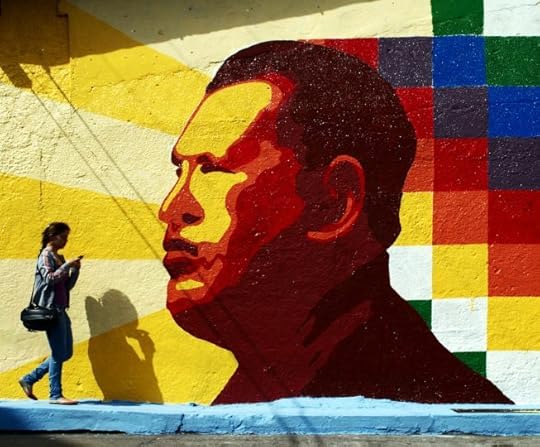
Image credit David Hern��ndez via Flickr (CC).
The��political, economic, and humanitarian��crisis in oil-rich��Venezuela��has caught the world���s attention.��As foreign powers position themselves for intervention, lessons from Africa��offer��insights into��what will��not��work��and��the dangers that lie ahead.
This is what we know.��When��Juan Hugo��Ch��vez��won��Venezuela���s��presidential election��in 1998, he was swept into office��on��a��platform calling for social revolution.��Although its huge��oil reserves made��Venezuela��one of��Latin America���s��richest��counties, it was��profoundly��unequal, with the��descendants of European settlers��dominating��the��state and economy.��Venezuela���s poor,��indigenous,��and African-Venezuelan��populations��rallied to Ch��vez��and his��call to��redistribute��wealth and power.��Following��Ch��vez���s��death��in 2013,��Nicol��s Maduro��was elected to office, claiming��his predecessor���s��socialist mantle. However,��the Maduro��government was��marred by authoritarian practices, human rights abuses,��and��economic mismanagement.��The vast majority of Venezuelans continued to live in extreme poverty,��and��millions��left the country��to survive.��Returned to office in��2018��in elections widely viewed as fraudulent, Maduro was confronted by massive popular protests��from across��the political and economic spectrum.
The crisis intensified in��January 2019,��when��Juan��Guaid��,��president of the��Venezuelan��National Assembly,��declared himself��president.��Deemed��a savior by some and a��usurper��by others,��Guaid����based��his��legitimacy��on��a constitutional clause that, in the absence of an elected head of state, vests power in the National Assembly president until free and��fair��elections��occur. Maduro, predictably,��refused to step aside;��his military and police remained loyal,��and��protests continued.��The��international community lined up to take sides��that aligned��with��their��political and��economic interests.��Some, including the United States,��hinted that military intervention may be in the offing.
Guaid�����s��international backers claim to be responding��to��a��power grab��by an illegitimate authoritarian regime.��They point to widespread opposition to Maduro��within��Venezuela��and��present��themselves as enforcers of the people���s will.��What is really��at stake��is��Venezuela���s enormous wealth���who��will��control it and whom��will��it��benefit.��Rather than resolve a humanitarian crisis, foreign intervention is certain��to intensify it.��The legacy of US intervention in Latin America, which��the United States has treated as its ���backyard��� since the nineteenth century, has left a bitterness that is far more powerful than��local��hostility toward��a brutal��president.��Foreign��meddling, with the aim of returning to power��the old oligarchy that enriched��foreign��businesses, is��likely��to��sharpen divisions, increase violence,��and��create a dangerous power vacuum.
Lessons from recent interventions in Africa��should be heeded.��Cases��from across the continent��underscore the fact that, regardless of the official rationale, external powers tend to intervene only where their own political, economic, and strategic interests are at stake.��Rather than promoting peace and stability,��foreign��military intervention��has��more��often��increased��outside support for repressive regimes,��exacerbated��local conflicts,��and undermined��prospects for regional peace.
Take the cases��of Libya��and Somalia���two of many that illustrate these points.��During the Arab Spring uprisings of 2011, foreign governments and��organizations��intervened in Libya, ostensibly��to protect civilian lives, but with��regime change��as��an��unofficial��objective.��The��NATO-backed��overthrow of��Muammar��Qaddafi��resulted��in��a power vacuum that opened the door to��civil war��and terrorist infiltration��in Libya, with widespread regional ramifications���including a military coup and jihadist insurgency in Mali��with��ripple effects throughout the Sahel.
Foreign intervention in Somalia, which��provoked��decades of instability and��a terrorist insurgency, is especially instructive.��After the Cold War, Western powers abandoned��the��Somali strongman, Siad Barre, whom they��no longer needed as a��regional policeman.��Warlords and militias vied for power, state institutions and basic services��crumbled, the formal economy ceased to function, and southern Somalia disintegrated into fiefdoms ruled by rival warlords and their militias. War-induced famine, compounded by drought, threatened the lives of much of the population.
In 1992, the UN Security Council authorized the establishment of a U.S.-led multinational military task force to��ensure the delivery of humanitarian relief.��In 1993, another UN mission, also led by the United States, permitted military personnel to forcibly disarm��and arrest��Somali warlords and militia��members.��As the��United States embroiled��itself��in Somalia���s civil war,��it��generated��enormous hostility��within the civilian population.��As a result, when US Special Operations Forces��attempted to capture key militia leaders in October 1993,��and��Somali��militias shot down two Black Hawk helicopters, angry crowds attacked the surviving soldiers and their rescuers.�� Eighteen American��troops��and some one thousand Somali men, women, and children were killed in the��violence that ensued.
The United States and��UN hastily withdrew��from Somalia, and the turmoil��intensified.��Islamist groups gained widespread popular support by providing essential social services and��courts to enforce��law and order. However, the United States, which viewed��all��Islamists as a threat,��worked with Somali warlords and neighboring Ethiopia to oust them.��The result was an anti-foreign��backlash��and the��transformation��of al-Shabaab,��originally��a��youth militia that defended the Islamic courts, into��a violent jihadist organization that quickly gained the support of al-Qaeda.��As��al-Shabaab took control of large swaths of��central and southern Somali��in 2007, the UN��and��African��Union��intervened,��neighboring countries��interceded to��push their own agendas, and al-Shabaab extended its targets to include them.��Today,��the Somali government,��weak��and��beholden to��outsiders, has little internal support, and al-Shabaab continues��to wreak havoc��in Somalia and��the region.
What lesson should be learned?��In Africa, foreign support for governments that��benefit��privileged elites and their external backers has��perpetuated violence and instability. It is��bound to do the same in Latin America.��Latin American��pro-democracy movements, like their��African��counterparts,��demand��access to education, employment, health care, clean water, sanitation,��electricity, and��infrastructure. They��call for��responsive democratic governments that respect the rule of law, eliminate corruption, and��distribute��resources��more equitably.��If��underlying political, economic, and social grievances are��ignored, intervention by outsiders��will��only��intensify violence and instability and��undermine��prospects for��an enduring peace.
American tribalism
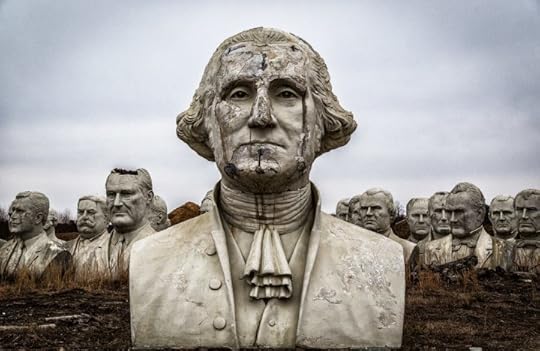
Image credit Mobilus In Mobili via Flickr (CC).
It is time to��shift the geography of political tribalism��in order to recognize��the United States as a tribal society. This was the essence of the keynote speech given by Kwame Anthony Appiah at�����A��Night of Philosophy��and Ideas�����held at the Brooklyn Public Library��on February 2, 2019. Though��reading��from a tablet,��with his voice barely rising above the din of people still entering through the front doors, Appiah���s message was clear:��the terminology��frequently, and often gratuitously, applied to��politics in��Africa and more specifically��Ghana, his childhood home,��should��now��be��applied to his home in the US. His perspective wasn���t entirely original���commentators as��different��as Steven Pinker, David Brooks��and Amy Chua��have��also��denounced recent American politics for��devolving into tribalism. But Appiah���s views carried��far��more��weight. Not only was this an instance of an African philosopher��irreverently��turning the tables of where tribalism��exists��in the world today, but here was an intellectual��who could ground��the issue��in history.��Tribalism��in his lecture��wasn���t simply generic��western-speak for the��absence of political civility. Appiah drew from firsthand experience.
As Appiah explained in his opening remarks,�����tribes��� and ���tribalism��� are ordinary terms with common��usage in Ghanaian English, unlike their pejorative���and frequently racist���meanings��in American English. To invoke ���tribal��� identity��is to signal an investment in��cultural and historical affiliations��that preceded��modern Ghana, with language, region, and other facets defining what counts as tribal. Appiah went further to describe how his father, Joe Appiah,��during the 1950s��promoted a national Ghanaian identity over ethnic��ones���in his case, an Asante heritage���in the buildup to and��aftermath of Ghana���s independence.��Though this principle of��national over tribal identity was never entirely��fulfilled, it remained an ideal, even when pride was taken in ethnic affiliation, as Anthony��Appiah readily admitted��to embracing.��Put simply, tribal identity still matters.
But there is a difference between�����tribe�����and�����tribalism.�����The problem isn���t with tribe��itself; the problem is when it is mobilized into the charged,��confrontational��and self-interested��practice of tribalism.��It is��this antagonism��that��his father struggled��against, and it is��through this distinction that Appiah��called upon the audience to do better in��the��present, to draw upon, in his words,�����the��better angels of our identities.”
Appiah, it can be said, has never been part of��a tradition of radical thought. His��consistent��emphasis��throughout a number of books��on individual choice in matters of identity and��moral philosophy can be faulted for not taking��full��account of systemic hierarchies��that inform civic identities and limit��political agency. In this sense, his case against tribalism, when taken too narrowly, neglects the��ways in which such practices have been��institutionalized over time. Mahmood��Mamdani��has argued that ethnic conflict in postcolonial Africa can partly be��attributed to the��enduring��structural legacies of indirect rule.��John Lonsdale has similarly contended that political tribalism��in Kenyan��politics��and elsewhere��must be understood as separate��from��an��internally meaningful�����moral ethnicity������a��distinction that approximates the one made by Appiah between tribalism and tribal��identity, but��with greater attention to the social, rather than individual, outcomes of such differences.
And��what of the American case?��Parallel��to��the common��framing��of��the US as an empire, which,��for good reason,��has preoccupied discussions on the left for almost two decades��now, the US as��a��colony��and��postcolony��should��also��be readdressed. The legacies of what might��be called��the�����political kinfolk�����of��indirect rule��can be identified.��The Three-Fifths Compromise��(1787), the Indian Removal Act (1830),��the Chinese Exclusion Act (1882), Jim Crow, and other formal and informal measures designed to govern,��but not represent, have instituted��racialized��conceptions of��US��citizenship��and political participation��that have lasted to the present. The��Electoral College, an antebellum��body��intended to��blunt��direct democracy in��presidential elections, persists��despite its��long outdated��18th-century origins. Indeed,��analogous��to colonial Natal���s Shepstone system, which served as a��19th-century��prototype for��20th-century��British��indirect rule, American politics continue��to be shadowed by ideas, laws and institutions that were either founded or nurtured during��the��1800s. In short, American tribalism isn���t a recent phenomenon of atavistic political��regression��as��Pinker, Brooks and Chua would have it. Rather, it is an intrinsic part of American political culture��with deep origins in the structures and attitudes established through slavery and the violence of settler colonialism.��An American political tribalism based on race, class, gender, and religion��was present at the start.
Peter��Ekeh, the Nigerian sociologist,��wrote over four decades ago of the two publics that emerged under colonial rule in Africa: the first being a ���primordial public��� that fostered moral values in the private realm,��and��the second being��a ���civic��public��� that was amoral (if not immoral)��and reflected society at large. These two publics contrasted with the one public��that existed in��western��societies. This single public also consisted of public and private realms, but these were bound together by a shared moral foundation.��Ekeh���s��consequent��argument was that the��creation of��these��two publics��in Africa��and their��subsequent��rivalry helped explain the animosity and corrosive effects of postcolonial��tribalism;��these��competing��publics��with colonial roots��and ethnic orientations��restricted��the possibilities of a shared moral order and political culture to flourish.
It��is��safe to say��that��the��two publics model also applies to��the��US, whether this difference is observed between online and offline worlds, red states versus blue states,��or some��familiar��variation.��The existence and possibilities of a shared moral ground appear increasingly remote, though it is hard to argue that there��ever��was one to begin with.��The conclusion here, however,��isn���t to accept this status quo and retreat��from civic life��to our respective��private��moral realms.��The��recurrent��violence of ethno-nationalism in Kenya and Rwanda, to offer two examples, is enough warning about the dangers of inaction.��Rather, a recognition and understanding of the endurance of��colonial effects���that��tribalism in Ghana, Nigeria, and the US��have features��in common���can open new forms of��political��citizenship��and moral��belonging,��without abandoning identities that carry meaning.��Indeed, this��approach��may be the only way.
In Appiah���s��concluding��words,�����for better or worse, it is only through identities that ideas can change the world.”
February 9, 2019
As teacher strikes sweep the US, educators in Africa organize against privatization
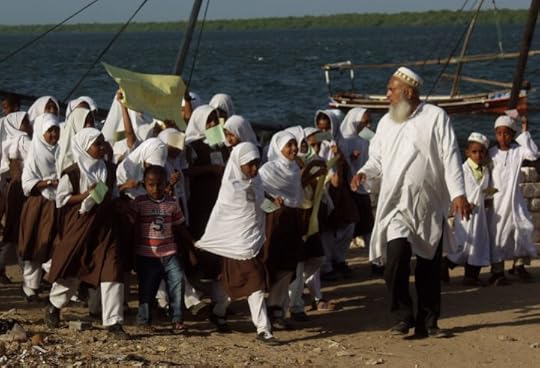
The teacher and his class. Lamu, Kenya. Image credit Rogiro via Flickr (CC).
Education International��(EI),��the��global federation of��education��unions has��32��million members worldwide, making it one of the largest and most influential in its sector. In Africa,��EI��represents��more than��three��million��teachers and other education workers in��49 countries.��One of our��key��goals��is to��halt and reverse��the privatization of education on the continent.��On February 11, 2019, when��African Union Heads of State meet in Addis Ababa, Ethiopia, we���ll be there to put pressure on heads of state. As Education International���s���African Regional committee��has��noted:�����We are witnessing a shift away from education as a public good. Far too many governments are retreating from their obligation as guarantors and providers of quality public education for all. We are seeing a reduction in education budgets and increased privatization of education, which has crept into our education systems and influenced policy and decision makers.���
This is how bleak��the state of��education��is��across our continent.
Education is a vehicle for human development and remains the most potent instrument for transforming lives. As governments across the globe work hard to improve the standard of living of their people it is evidentially unavoidable that education of the masses becomes a priority. The story becomes even more urgent��in��developing countries,��especially in Africa, where education exclusion is so high.
Article 26 of the��Universal��Declaration on Human Right emphasizes the need for education to be free and accessible,��especially at the elementary level. Both the millennium development goals and the sustainable development goals captured education as a universal priority,��which constantly��prick the minds of world leaders to invest in the education of their people.
History is rife��with��radical policies adopted by many young,��independent African countries to make education a state responsibility. Hitherto, education in the colonies was mainly in the hands of private operators, particularly religious bodies. African countries have moved steadily��forward��in the provision of education,��albeit��with��funding challenges.
However, the turn of the millennium has witnessed a new��phenomenon��working hard to take over the provision of education across the globe, especially in developing countries.�� This new phenomenon is powered by agents of��privatisation��and��commercialisation. These are people who see education as a commercial, profit making��venture.�� They try to convince governments that they can produce better outcomes��more economically��and,��if given the chance,��provide��better��value-for money services. Their proposals are mainly appealing to governments who concede that they continue to throw funds at underperforming public education.�� Such is how our governments can be made to abstain from their constitutional obligation regarding education.�� These private firms��currently operate in different forms. They sign operational contract with governments and take��over the running of public schools. They also sometimes come in as private investors, set up chains��of schools, notably Bridge and Omega schools, as so called low-fee for profit schools in the��peri-urban areas.�� They attack our traditional public��schools��to make them less attractive to parents and children. As��they snake rapidly into the system, the��state begins to, sadly,��take its eye off public schools and rather lend support to these forces of commercialization.
Education is a public good. In other words, education is a service that must be guaranteed and provided��the state��to the public.����Education��is the foundation for human development and the state cannot deny anyone of such right on the basis of cost.�� Allowing Bridge and Omega to thrive in their current forms��means we are auctioning our future well-being to the highest bidder. Their��method of imparting knowledge is a sell-out of our culture as a people. Their scripted��learning reduces instruction��to��mechanistic teaching,��where teachers��have limited��professional autonomy. It busily prepares students to pass high stakes test and denies our children other benefits of schooling.�� As��the��focus��of��attention��shifts to��device screens the critical social aspect of education is lost. As Africans, we need not remind ourselves of the challenges of handling big data with our slow��and��expensive internet connectivity,��and��the lack of it in our hard to reach villages.
Bridge International Academies and the likes are demeaning teacher self-esteem and professionalism.��Extant literature��points to poor treatment of teachers in��this��chain of schools in Kenya��and��Uganda.�� With economic interest as the priority, they pay teachers poorly, provide no security of tenure and mostly employ��unqualified��teachers, according to��studies conducted in Kenya and Ghana on Bridge International Academies and Omega schools respectively.�� The corporations that��run��and back��these school chains are inconsiderate of the financial position of parents.��Children are sacked from school anytime��parents are unable to meet fees payments.��Innocent children are denied education because their parents are poor.��Clearly, this is not the game-changing silver bullet that is expected to rescue the African child from the so-called education melee.
Elected African teacher union��leaders��have released a statement��alongside the African Union Heads of State meeting in Addis Ababa. Representatives of teachers and education workers in Africa��have��made three clear demands on our��leaders:
Reject��privatisation and profit-making in education because of the threat it poses to education as a human right and public good;
Prioritise��the achievement of inclusive and equitable quality free public education for all, and
Realise��the internationally-agreed minimum education funding benchmarks by allocating at least 6% of a country���s GDP or 20% of the national budget to education.
These��must be��met,��unconditionally,��for��the achievement of��Agenda 2063���The Africa We Want.
Education��is a public good and a��human right. It must be tailored to bridge the gap between the haves and have nots.�� If Africa is to take its rightful place in the comity of nations, Africa must strive for a literate society by investing in the education of its people.��States must take full responsibility for education delivery, invest in education��and run education as a��social service. Africa must not bow��to pressure��from�� development��partners and donors who appear to have a soft spot for people who place profit before books. Africa must reject��privatization and��commercialization of education.��The shift away from education as a public good is dangerous and must be stopped.��The Africa��We��Want��can only be achieved through��well-funded quality��public��education��guaranteed and provided��by the state.
Halting the corporate capture of education in Africa

The teacher and his class. Image credit Rogiro via Flickr (CC).
Education International��(EI),��the��global federation of��education��unions has��32��million members worldwide, making it one of the largest and most influential in its sector. In Africa,��EI��represents��more than��three��million��teachers and other education workers in��49 countries.��One of our��key��goals��is to��halt and reverse��the privatization of education on the continent.��On February 11, 2019, when��African Union Heads of State meet in Addis Ababa, Ethiopia, we���ll be there to put pressure on heads of state. As Education International���s���African Regional committee��has��noted:�����We are witnessing a shift away from education as a public good. Far too many governments are retreating from their obligation as guarantors and providers of quality public education for all. We are seeing a reduction in education budgets and increased privatization of education, which has crept into our education systems and influenced policy and decision makers.���
This is how bleak��the state of��education��is��across our continent.
Education is a vehicle for human development and remains the most potent instrument for transforming lives. As governments across the globe work hard to improve the standard of living of their people it is evidentially unavoidable that education of the masses becomes a priority. The story becomes even more urgent��in��developing countries,��especially in Africa, where education exclusion is so high.
Article 26 of the��Universal��Declaration on Human Right emphasizes the need for education to be free and accessible,��especially at the elementary level. Both the millennium development goals and the sustainable development goals captured education as a universal priority,��which constantly��prick the minds of world leaders to invest in the education of their people.
History is rife��with��radical policies adopted by many young,��independent African countries to make education a state responsibility. Hitherto, education in the colonies was mainly in the hands of private operators, particularly religious bodies. African countries have moved steadily��forward��in the provision of education,��albeit��with��funding challenges.
However, the turn of the millennium has witnessed a new��phenomenon��working hard to take over the provision of education across the globe, especially in developing countries.�� This new phenomenon is powered by agents of��privatisation��and��commercialisation. These are people who see education as a commercial, profit making��venture.�� They try to convince governments that they can produce better outcomes��more economically��and,��if given the chance,��provide��better��value-for money services. Their proposals are mainly appealing to governments who concede that they continue to throw funds at underperforming public education.�� Such is how our governments can be made to abstain from their constitutional obligation regarding education.�� These private firms��currently operate in different forms. They sign operational contract with governments and take��over the running of public schools. They also sometimes come in as private investors, set up chains��of schools, notably Bridge and Omega schools, as so called low-fee for profit schools in the��peri-urban areas.�� They attack our traditional public��schools��to make them less attractive to parents and children. As��they snake rapidly into the system, the��state begins to, sadly,��take its eye off public schools and rather lend support to these forces of commercialization.
Education is a public good. In other words, education is a service that must be guaranteed and provided��the state��to the public.����Education��is the foundation for human development and the state cannot deny anyone of such right on the basis of cost.�� Allowing Bridge and Omega to thrive in their current forms��means we are auctioning our future well-being to the highest bidder. Their��method of imparting knowledge is a sell-out of our culture as a people. Their scripted��learning reduces instruction��to��mechanistic teaching,��where teachers��have limited��professional autonomy. It busily prepares students to pass high stakes test and denies our children other benefits of schooling.�� As��the��focus��of��attention��shifts to��device screens the critical social aspect of education is lost. As Africans, we need not remind ourselves of the challenges of handling big data with our slow��and��expensive internet connectivity,��and��the lack of it in our hard to reach villages.
Bridge International Academies and the likes are demeaning teacher self-esteem and professionalism.��Extant literature��points to poor treatment of teachers in��this��chain of schools in Kenya��and��Uganda.�� With economic interest as the priority, they pay teachers poorly, provide no security of tenure and mostly employ��unqualified��teachers, according to��studies conducted in Kenya and Ghana on Bridge International Academies and Omega schools respectively.�� The corporations that��run��and back��these school chains are inconsiderate of the financial position of parents.��Children are sacked from school anytime��parents are unable to meet fees payments.��Innocent children are denied education because their parents are poor.��Clearly, this is not the game-changing silver bullet that is expected to rescue the African child from the so-called education melee.
Elected African teacher union��leaders��have released a statement��alongside the African Union Heads of State meeting in Addis Ababa. Representatives of teachers and education workers in Africa��have��made three clear demands on our��leaders:
Reject��privatisation and profit-making in education because of the threat it poses to education as a human right and public good;
Prioritise��the achievement of inclusive and equitable quality free public education for all, and
Realise��the internationally-agreed minimum education funding benchmarks by allocating at least 6% of a country���s GDP or 20% of the national budget to education.
These��must be��met,��unconditionally,��for��the achievement of��Agenda 2063���The Africa We Want.
Education��is a public good and a��human right. It must be tailored to bridge the gap between the haves and have nots.�� If Africa is to take its rightful place in the comity of nations, Africa must strive for a literate society by investing in the education of its people.��States must take full responsibility for education delivery, invest in education��and run education as a��social service. Africa must not bow��to pressure��from�� development��partners and donors who appear to have a soft spot for people who place profit before books. Africa must reject��privatization and��commercialization of education.��The shift away from education as a public good is dangerous and must be stopped.��The Africa��We��Want��can only be achieved through��well-funded quality��public��education��guaranteed and provided��by the state.
February 5, 2019
Scenes from a youthful uprising
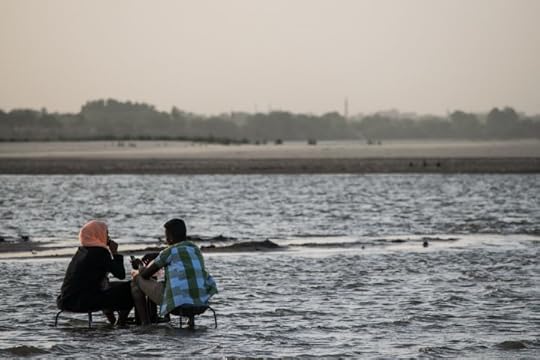
Image credit Jedrek Burak via Flickr (CC).
More than 60% of Sudan���s population of almost 40 million people have never known a president of their country other than Omar al-Bashir. The young men and women visible in daily reports of the uprising in Khartoum and other Sudanese cities and towns over the last 5 weeks have lived a lifetime of constraints under the Bashir regime���s ���revolution of national salvation,��� which took power in June 1989. At its onset, secondary school students were forced to wear camouflage-style uniforms to their classrooms; their older brothers were conscripted to fight the losing war against the Sudan People���s Liberation Army (SPLA), a war which ended up with Sudan, which had been Africa���s largest country, losing one-third of its territory as South Sudan broke away. Millions of Sudanese and South Sudanese died or were displaced in that process as well. For Bashir to remain in power against a catastrophic backdrop he adopted the tactics of violent extremism, strategies most usually found among non-state actors in his region.
The young people in the streets of the capital today, and significantly outside of the capital as well, have responded to the Bashir regime���s violence with an organized protest for peace and democratic change. While the president revealed himself time and again as a leader who hates his own people���bombing children in schools in the��Nuba��Mountains or Darfur over the long decades of his rule���the youth demonstrating in the streets today are united in a consistent voice of��tusqut��bas!�����Just fall, that���s all!��� This is a message to Bashir and his corrupt and incompetent cronies who have embezzled Sudan���s wealth and exploited her people���s faith. Meanwhile Bashir and his people blame ���economic problems and foreign saboteurs��� for the unrest,��the people in the streets are asking for ���freedom, peace and justice.���
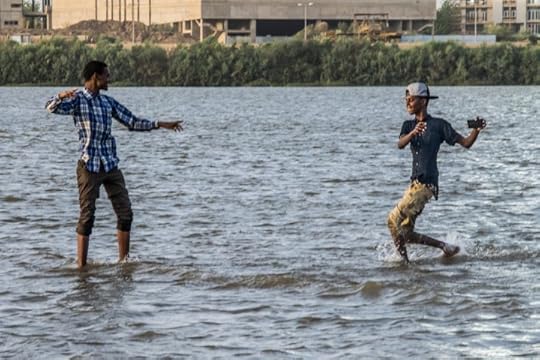 Image credit Jedrek Burak via Flickr (CC).
Image credit Jedrek Burak via Flickr (CC).These young Sudanese are dedicated to social media, which is their link to their brothers and sisters in the enormous Sudan diaspora and across urban Sudan���s congested sprawl. Sending out messages of encouragement, reports and videos of atrocities to all���WhatsApp a crowd favorite���has kept momentum alive. The videos are vivid with images of grandmothers shouting for Bashir to ���get out!��� And of young men and women waving Sudanese flags and rushing unarmed towards troops positioned on trucks to block their paths. When the Bashir regime���determined to disrupt the discourse of the streets���cut internet access to Facebook, Instagram and WhatsApp, the response of a young tech-savvy nation was to jump on VPNs within hours of the government���s move.
The strength of the crowds in the streets comes from the intense solidarity and pent-up fury that have been carefully nurtured by a cruel regime. Government troops now have shoot-to-kill orders��with the heads of young men their targets. These troops and the recently transformed ���Janjaweed��� forces, which had been posted to the Egyptian border and paid for with EU funds to stem the flow of migrants, are now invading hospital emergency rooms where they finish off those they could not kill in the streets. Despite Bashir���s policies of dividing the nation into ethnic enclaves, the people have resisted and joined across generations and regions in this ���fight to the end,��� as one activist put it. He added, ���there is no turning back from this fight.��� Meanwhile, Salah Ghosh, Bashir���s security chief, dared the revolt in the streets to ���try to stage 2 demonstrations in Khartoum at the same time.��� They managed to launch��eighty demonstrations.
February 4, 2019
I have rarely seen a people pray as much as Haitians do
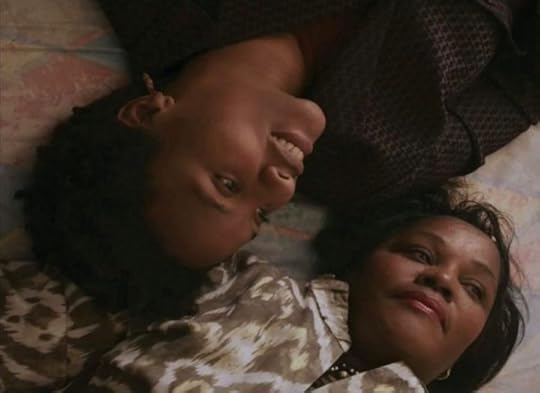
Still from film Douvan��Jou��Ka��Leve.
When��Douvan��Jou��Ka��Leve��(���The Sun Will Rise���) received the ���Best Documentary Feature��� award at Philadelphia���s��BlackStar��Film Festival��in��August��2018, its director,��Gessica��G��n��us��was not present.��G��n��us��did not make it to Philadelphia, site of the US premiere of her film, at all. Instead, she was home in Haiti��where��protests��had��erupted��in��the country���s capital, Port-Au-Prince,��following the government���s attempt to raise fuel prices in early July��2018. Her��absence at the festival felt like a clear indication of where her loyalties lie.��G��n��us��� film does not fall prey to the same afflictions of, for example, the late V.S. Naipaul, an Indo-Caribbean writer whose portrayals of Africa and other parts of the Third World were often unsympathetic,��and yet Nobel Prize-worthy.��(Edward Said��described��Naipaul as ���a third��worlder��denouncing his own people, not because they are victims of imperialism, but because they seem to have an innate flaw, which is that they are not whites.���)
Douvan��Jou��Ka��Leve��begins with a narrated introduction of the enduring legacies of colonialism, the African slave trade, and contemporary religious practice.��G��n��us��describes how in addition to the servitude of forced labor, a mental servitude was imposed through Christianity���s elevation of whiteness to godliness. God was not only a reflection of divinity, but a theological-cum-panopticonal��projection of white colonial omnipresence, omniscience, and omnipotence.��In French, she says: ���Today Haiti is the poorest country in the Caribbean, yet I have rarely seen a people pray as much.��� She continues: ���So what are we doing wrong? How long will we have to pay? What is this debt that we need to reimburse?��� The radical inquiry is not quiet here. (And anyway, interrogations of colonialism are not suited for subtlety.)
A subjugated blackness���a colonial scriptural interpretation of the��curse of Ham��from the Book of Genesis���is punishment for endeavoring to be free. ���Emancipation instituted indebtedness,��� writes��Saidiya��Hartman. The biblical analogy is easy not only because contemporary Haitian social tensions are situated within a matrix of religious institutions, but also because of how we can understand Haiti���s social and economic condition as a karmic and material punishment for becoming the world���s first independent Black republic: a successful revolt of self-liberated enslaved peoples of what was called Saint-Domingue against a colonial superpower, both trans-Atlantic humiliation and inspiration. The racialized nature of the curse���one placed by Noah upon Ham���s line after his father, Canaan, saw his father, Noah, in the nude���is a misreading of Old Testament scripture. But its absorption into Eurocentric theologies imposed upon Haiti have been profound. Noah���s curse applied only to Ham���s eldest son, Cush: per old��Babylonic��Talmudic tradition, Cush (also ���Kush���) was of sub-Saharan African descent and so all of his accursed lineage who bore the curse ���smitten in [their] skin��� were condemned to punishment both in this earthly realm and in the next life. Religion was the vector that would impose-justify this punishment and could also deliver sweet relief from it���G��n��us��uses this battle for spiritual legitimacy as analogy. The often-desperate religiosity evokes parallels on the African continent���s��for-profit prophet-industrial complex where Pentecostal churches and their leadership claim to be able to provide otherworldly solutions to material crises ranging from poverty to unfaithful spouses to nightmares to demonic possession and spiritual husbands to cancer and blindness and AIDS.
It is through these meeting and competing��religio-cultural and biomedical frames that mental illness as the��island���s��sickness is understood. Over and over,��G��n��us��shows images of churchgoers overtaken by spiritual energies. She shows one woman being gently restrained and soothed by a nearby male congregant because she is convulsing and speaking in tongues and, with eyes rolled into her head, in a trancelike state. As she visits an asylum looking for paperwork, we see female residents behind a grated window speaking in ways we might call unintelligible. One woman says she does not wish to serve the devil anymore and that ���the people��� here serve Lucifer. A woman beside her with a tremor shares that she stopped taking her medications, and they now inject her with something that makes her shake. A shot of a ���crazy��� woman with bound hands and feet fades seamlessly into another of a church service where, once again, the congregation is swept in religious fervor. What is the difference, this juxtaposition implores, between speaking in tongues because one is channeling the holy spirit and the frenetic and incomprehensible speech from a manic episode (especially when some people claim to��hear the voice of God��or the devil during��auditory hallucinations)?
Mental illness, to some Haitians, is a residual madness from the��Vodou��that was conjured on the eve of the Haitian Revolution. The ceremony at��Bwa��Kayiman/Bois��Ca��man���the��Vodou��ceremony commonly understood as the start of the revolution���can either be interpreted as the ancestral conjuring and interaction that animated the Haitians to fight for their freedom or, per Haitian evangelists and Protestants, a pact with the devil with lasting consequences. Pat Robertson��invoked��this negative characterization in his comments after the earthquake, saying that Haitians have ���been cursed by one thing after the other��� ever since. The devil pact theory justifies both stigmatization of mentally ill people and reactionary [hyper]religiosities, and G��n��us personalizes this friction in her journey to learn about her mother���s own mental illness. Motherhood is a memetic, but nevertheless useful, analogy for one���s relationship to land, violence, memory, suffering, and, of course, redemption.
In attempting to��narrativize��struggles of both homeland and diaspora, we often encounter creative pulls in multiple but equally strong directions. In one direction is a reductive flattening where our nostalgia compels us to romanticize and sanitize native conflicts and struggles because we are afraid of providing ammunition to whites who will inevitably��weaponize��such traumas against us. In another direction, our witnessing and experiences of corruption and patriarchy can lead us to conclude that our flaws and lagging development lie with us alone. But with artistic grace,��and while balancing a clear anticolonial counter-narrative with affective and evocative cinematography,��G��n��us��indicts both the violence of colonialism��and��postcolonial moral-religious economies that are maintained by Haitian people (while still clearly depicting them as a product of material desperation). In 2017, another Haitian film,��Guetty��Felin���s��Ayiti��Mon Amour, screened at��BlackStar. It too, through magical realism, resists��the temptation of offering filmgoers a Haiti that is singularly familiarized to us through post-earthquake strife.
The documentary form can often be fraught because of a presumed objectivity in capturing or attempting to communicate a particular subject, as though we can ever observe or record without either act being imbued with our own values and meaning.��Laura��Brownson���s��The Rachel Divide (2018)��offered a documentation of the ���controversy��� around Rachel��Dolezal��by giving her an opportunity to tell her story in her own words.��Brownson��challenges��Dolezal��only once, largely allowing��her story to ���speak for itself��� and��inviting��viewers to form their own conclusions. But if��Dolezal���s��identity and relationship to blackness were so self-explanatory, then how has she been a topic of debate since 2015? Is it not the responsibility of a documentarian to contextualize the intentions and values of the film and its subject matter?��Douvan��Jou��Ka��Leve��is a beautiful example of documentary storytelling done right���through its deft interweaving of the personal and the macro-cultural, it illustrates a politic that is messy and unresolved while also depicting an individual���s opportunity for personal peace and reconciliation.
And yet we pray
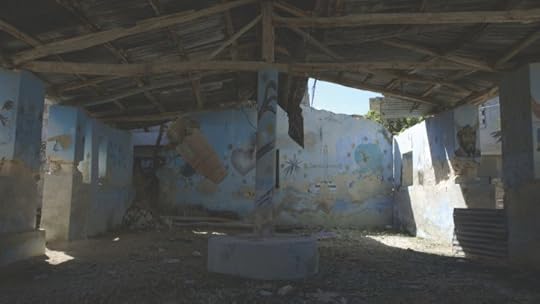
Still from film Douvan��Jou��Ka��Leve.
When��Douvan��Jou��Ka��Leve��(���The Sun Will Rise���) received the ���Best Documentary Feature��� award at Philadelphia���s��BlackStar��Film Festival��in��August��2018, its director,��Gessica��G��n��us��was not present.��G��n��us��did not make it to Philadelphia, site of the U.S. premiere of her film, at all. Instead, she was home in Haiti��where��protests��had��erupted��in��the country���s capital, Port-Au-Prince,��following the government���s attempt to raise fuel prices in early July��2018. Her��absence at the festival felt like a clear indication of where her loyalties lie.��G��n��us��� film does not fall prey to the same afflictions of, for example, the late V.S. Naipaul, an Indo-Caribbean writer whose portrayals of Africa and other parts of the Third World were often unsympathetic,��and yet Nobel Prize-worthy.��(Edward Said��described��Naipaul as ���a third��worlder��denouncing his own people, not because they are victims of imperialism, but because they seem to have an innate flaw, which is that they are not whites.���)
Douvan��Jou��Ka��Leve��begins with a narrated introduction of the enduring legacies of colonialism, the African slave trade, and contemporary religious practice.��G��n��us��describes how in addition to the servitude of forced labor, a mental servitude was imposed through Christianity���s elevation of whiteness to godliness. God was not only a reflection of divinity, but a theological-cum-panopticonal��projection of white colonial omnipresence, omniscience, and omnipotence.��In French, she says: ���Today Haiti is the poorest country in the Caribbean, yet I have rarely seen a people pray as much.��� She continues: ���So what are we doing wrong? How long will we have to pay? What is this debt that we need to reimburse?��� The radical inquiry is not quiet here. (And anyway, interrogations of colonialism are not suited for subtlety.)
A subjugated blackness���a colonial scriptural interpretation of the��curse of Ham��from the Book of Genesis���is punishment for endeavoring to be free. ���Emancipation instituted indebtedness,��� writes��Saidiya��Hartman. The biblical analogy is easy not only because contemporary Haitian social tensions are situated within a matrix of religious institutions, but also because of how we can understand Haiti���s social and economic condition as a karmic and material punishment for becoming the world���s first independent Black republic: a successful revolt of self-liberated enslaved peoples of what was called Saint-Domingue against a colonial superpower, both trans-Atlantic humiliation and inspiration. The racialized nature of the curse���one placed by Noah upon Ham���s line after his father, Canaan, saw his father, Noah, in the nude���is a misreading of Old Testament scripture. But its absorption into Eurocentric theologies imposed upon Haiti have been profound. Noah���s curse applied only to Ham���s eldest son, Cush: per old��Babylonic��Talmudic tradition, Cush (also ���Kush���) was of sub-Saharan African descent and so all of his accursed lineage who bore the curse ���smitten in [their] skin��� were condemned to punishment both in this earthly realm and in the next life. Religion was the vector that would impose-justify this punishment and could also deliver sweet relief from it���G��n��us��uses this battle for spiritual legitimacy as analogy. The often-desperate religiosity evokes parallels on the African continent���s��for-profit prophet-industrial complex where Pentecostal churches and their leadership claim to be able to provide otherworldly solutions to material crises ranging from poverty to unfaithful spouses to nightmares to demonic possession and spiritual husbands to cancer and blindness and AIDS.
It is through these meeting and competing��religio-cultural and biomedical frames that mental illness as the��island���s��sickness is understood. Over and over,��G��n��us��shows images of churchgoers overtaken by spiritual energies. She shows one woman being gently restrained and soothed by a nearby male congregant because she is convulsing and speaking in tongues and, with eyes rolled into her head, in a trancelike state. As she visits an asylum looking for paperwork, we see female residents behind a grated window speaking in ways we might call unintelligible. One woman says she does not wish to serve the devil anymore and that ���the people��� here serve Lucifer. A woman beside her with a tremor shares that she stopped taking her medications, and they now inject her with something that makes her shake. A shot of a ���crazy��� woman with bound hands and feet fades seamlessly into another of a church service where, once again, the congregation is swept in religious fervor. What is the difference, this juxtaposition implores, between speaking in tongues because one is channeling the holy spirit and the frenetic and incomprehensible speech from a manic episode (especially when some people claim to��hear the voice of God��or the devil during��auditory hallucinations)?
Mental illness, to some Haitians, is a residual madness from the��Vodou��that was conjured on the eve of the Haitian Revolution. The ceremony at��Bwa��Kayiman/Bois��Ca��man���the��Vodou��ceremony commonly understood as the start of the revolution���can either be interpreted as the ancestral conjuring and interaction that animated the Haitians to fight for their freedom or, per Haitian evangelists and Protestants, a pact with the devil with lasting consequences. Pat Robertson��invoked��this negative characterization in his comments after the earthquake, saying that Haitians have ���been cursed by one thing after the other��� ever since. The devil pact theory justifies both stigmatization of mentally ill people and reactionary [hyper]religiosities, and G��n��us personalizes this friction in her journey to learn about her mother���s own mental illness. Motherhood is a memetic, but nevertheless useful, analogy for one���s relationship to land, violence, memory, suffering, and, of course, redemption.
In attempting to��narrativize��struggles of both homeland and diaspora, we often encounter creative pulls in multiple but equally strong directions. In one direction is a reductive flattening where our nostalgia compels us to romanticize and sanitize native conflicts and struggles because we are afraid of providing ammunition to whites who will inevitably��weaponize��such traumas against us. In another direction, our witnessing and experiences of corruption and patriarchy can lead us to conclude that our flaws and lagging development lie with us alone. But with artistic grace,��and while balancing a clear anti-colonial counter-narrative with affective and evocative cinematography,��G��n��us��indicts both the violence of colonialism��and��post-colonial moral-religious economies that are maintained by Haitian people (while still clearly depicting them as a product of material desperation). In 2017, another Haitian film,��Guetty��Felin���s��Ayiti��Mon Amour, screened at��BlackStar. It too, through magical realism, resists��the temptation of offering filmgoers a Haiti that is singularly familiarized to us through post-earthquake strife.
The documentary form can often be fraught because of a presumed objectivity in capturing or attempting to communicate a particular subject, as though we can ever observe or record without either act being imbued with our own values and meaning.��Laura��Brownson���s��The Rachel Divide (2018)��offered a documentation of the ���controversy��� around Rachel��Dolezal��by giving her an opportunity to tell her story in her own words.��Brownson��challenges��Dolezal��only once, largely allowing��her story to ���speak for itself��� and��inviting��viewers to form their own conclusions. But if��Dolezal���s��identity and relationship to blackness were so self-explanatory, then how has she been a topic of debate since 2015? Is it not the responsibility of a documentarian to contextualize the intentions and values of the film and its subject matter?��Douvan��Jou��Ka��Leve��is a beautiful example of documentary storytelling done right���through its deft interweaving of the personal and the macro-cultural, it illustrates a politic that is messy and unresolved while also depicting an individual���s opportunity for personal peace and reconciliation.
February 3, 2019
Democracy by numbers
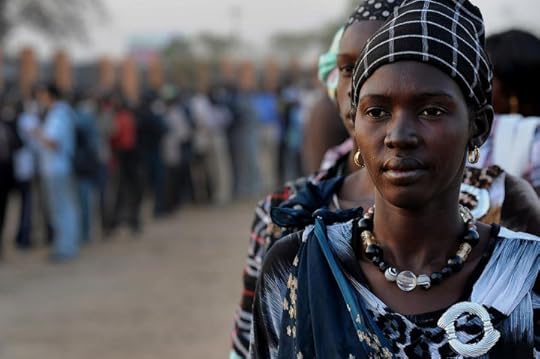
Image credit Tim McKulka via UN Photo Flickr (CC).
A��key political trend of the past three decades is��the spread of��formal democracy��through the global South.��This posed a challenge to mainstream academics and commentators in the North��who were used to thinking of��democracy as the��property��of the white-run countries of Western Europe and North America. Since the 19th��century, when��John William Burgess,��the American credited with founding academic political science,��insisted that��only��the “Teutonic” races (white Anglo Saxons) had a gift for�����liberty,�����democracy had become code for�����run by civilized white people.�����Later, the revered US scholar Seymour Martin��Lipset��offered a liberal version of Burgess���s view by insisting that only countries which embraced market economics and�����western��culture�����could��be democratic.
On one level, democracy���s spread��could be seen as a triumph of��western��civilization���many mainstream academics��were pleased that everyone was now embracing the ways of the West. But it was also a problem because democracy isn���t a��western��preserve at all.
In my new book,��Power in Action: Democracy, Citizenship and Social Justice, I argue that the democratic idea is that every adult has a right to an equal say in all decisions��that��affect them. Democracy is established and sustained not by white missionaries but by collective action. It is born, and grows, when people who have been excluded from decision-making are able to��organize,��to force themselves into the conversation.��That does not necessarily mean taking to the streets, although it might���the most��effective��collective action, the��sort��almost always used by the powerful,��is the�����routine�����kind,��such as belonging to associations��that��influence policy.��But it does mean gaining an organized collective voice.
So the��problem��for the��northern��colonizer��of the mind��is that��democracy��may be used not to affirm their values, but to reject them.��It was no done deal that the new democracies��of the South would��become��western��democracies which, in their view, are the only��real��ones, to which all others should aspire.��This worry created a body of academic writing���the��democratic consolidation��approach,��which��examined��whether new democracies were��consolidated���meaning��whether they resembled a romanticized version of democracies��in��the North.
This��approach also created the democracy��scoring��index which gave��scientific��credibility to the��consolidation��approach by ranking democracies and then assigning��them��a numerical score or a ranking��in��an index.��The US-based��Freedom��House��is the best-known: it��ranks all countries as��free,��partially free��or not free; the��UK-based Economist Intelligence Unit ranks countries as��authoritarian,��hybrid,��flawed democracies��and��full democracies.
Democracy by numbers gives great power to the colonial��assumptions of the��consolidation��approach.��Academics��who��prefer the mathematics of regression analysis to rational thought (which today, in the North, means most) can feed the Freedom House scores or those of the��other indexes��into computer programs��and make sweeping claims about democracy throughout the world.��The scores are��also��handy references for journalists or social media debaters. And so they come to play a crucial role in the way democracy is seen.
Like all colonial assumptions, the democracy by numbers business says more about the prejudices of those who compile��the indices��than the state of the world.��Freedom House always gives��northern��countries a score of 1, which means��free��(even when they detain people without trial or gerrymander elections). The Economist allows the odd southern country to become a��full democracy,��but��generally populates��this club��with��northern��countries despite the fact that there is no evidence that their democracies are more��real��than those of the South.
Although��the numbers give a false sense of authority, they are based on opinions, not an��objective��measure;��if you put numbers to opinions, they are still��opinions. And, since the opinions are those��of mainstream���northern scholars or others who think��like��them���the effect is to turn the latter-day versions of Burgess and��Lipset���s��prejudices into the way many people with great influence see the world.
Next time someone tries to make or clinch an argument with a democracy index, remember the prejudices��that��lie behind the numbers.
February 2, 2019
Hopes for a Green October in Sudan
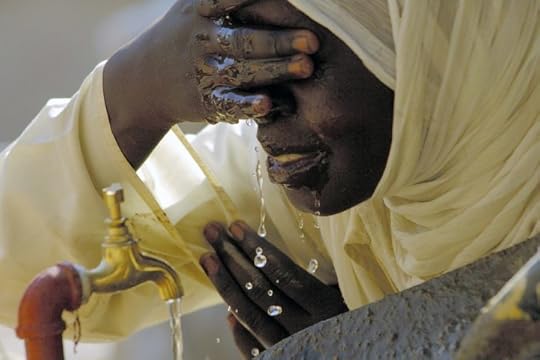
Image credit UN Photo via Flickr (CC).
Early in January��2011 as Sudan was going through the process of splintering in two, I was filming�����Our Beloved Sudan,��� my documentary about the secession. I was interviewing Mohamad��Wardi��, the��famous singer and political activist.��Wardi��interrupted me mid-interview and asked,�����what about October?��That should go in your film.���
Wardi��was��of course��referring to the October uprising of 1964 when the military regime of General Ibrahim Abboud was overthrown as a result of a popular uprising. In January 2011 the Arab Spring uprisings had spread from Tunis to Cairo and hopes were high for a Middle East transforming itself from dictatorship to liberal democracy by the hands, feet and voice of the people. At the time Sudan remained untouched by the so-called Arab Spring fever. I said to��Wardi, how is October shaping this generation, can you really compare us to the generation that realized the October uprising? He said, why not, you are the grandchildren of the October revolution, I have faith in the Sudanese people.
Wardi��also said, “for as long as the artist is able to create he does not age.”
Had he lived, there is a big��chance Wardi��would��have remade his famous anthem, ���Green October,��� in honor of the 1964 uprising for this WhatsApp and hip hop generation,��or he may have produced an entirely new rousing anthem. I imagine him marching up to the presidential palace, demanding an audience with Omar al Bashir, Sudan���s de facto leader since 1989, and telling him in no uncertain terms that his behavior is despicably un-Sudanese.��The��late singer��had the impetuous courage and stature for such actions. He would have been proud of and in solidarity with the young men and women who have gone out in the streets to face live bullets as they chant, ���Down with the merchants of religion,��� and ���Peaceful, peaceful!���
The��latest��uprising began in Atbara in mid-December 2018 as a result of the removal of the subsidy on bread. It��quickly spread to the capital Khartoum as well as to other cities around Sudan. Loss of oil revenue income following the secession of South Sudan, mismanagement of public funds as well as the free fall of the Sudanese pound following the lifting of sanctions, had��derailed the Sudanese economy. Lifting of the subsidy on bread and fuel by the government was the straw that broke the camel���s back. But, underlying the immediate economic causes for the uprising are deeper political concerns. Bashir has been in power for 30 years.��And his regime��is��no longer able to deliver on the most basic needs. Cues for bread and fuel abound and the banks have put caps on cash withdrawals.
Some commentators have referred to Sudan���s uprising as a late Arab Spring. On the contrary, the Sudanese are veterans of peaceful popular uprisings as was the case in 1964 during Abboud���s presidency and then again in 1985 when��Gaffar��Mohamad Nimeiri was toppled. In both instances peaceful popular uprisings resulted in military dictatorships being replaced by��democratically elected governments,��albeit short lived. The October uprising of 1964 is how Sudanese of a certain generation like to see themselves. It is an image of a people who do not wait for history to happen to them but who go out into the streets to make it.�����Green October,�����Wardi���s��famous anthem to the revolution eulogizes the defiant will of the people, ���Armed by October we will not retreat. We shall stamp upon stone until the stone yields green crops … in your name October the people are victorious and the prison gates crushed …���
But, the political landscape of 1964 and 1985 is not the landscape of 2019. The moral compasses of both Aboud and Nimeiri could not permit the army to shoot the��Khartoumi��unarmed, civilian demonstrators. These generals did have blood on their hands but it was the blood of armed rebellions in Sudan���s peripheries in the south and the west of the country although that is not to deny civilians in these peripheries were sometimes targets or that they suffered casualties in the crossfire. ���Tasqut��bas�����(���you must fall���),��the refrain of this uprising,��is a reproach to Bashir and his regime. Spilling the blood of unarmed, peaceful protestors in the capital is unprecedented, it is un Sudanese and you must go,�����tasqut��bas.��� In October 1964 Abboud agreed to go in return for an amnesty from prosecution for war atrocities in the south of the country. Those like Sudanese British billionaire Businessman, Mo Ibrahim who��is recommending an amnesty for al-Bashir from the ICC where he is wanted for alleged crimes against humanity in Darfur in return for his relinquishing power are doing so in the hope that this would facilitate a peaceful regime change in Sudan. What would you say to a mother who has lost a child in Darfur the BBC Radio presenter asked him, I will say we need to drop the ICC charges so as to save your second child, he said.
The West���s politicians as well as its mainstream media doesn���t seem to know what to do with the narrative of the 2019 uprising, it does not fit the story we are often told about Sudan. There are no Arab/ African or Muslim/ Christian schisms to inspire the righteous anger of the Hollywood celebrity class that has championed the plights of South Sudan and Darfur. This is simply the story of everyday Sudanese people from diverse ethnicities and backgrounds saying, after 30 years it���s time for change, time for an end to corruption, that we deserve and demand a viable��civil service and institutions that serve the public interest rather than line the pockets of a regime affiliated elite.
In 2011 as I was making ���Our Beloved Sudan��� I was trying to capture how the Sudanese talked about themselves in the lead up to the partition of their country. The popular slogan emanating from the Omdurman national radio service was, we are all brothers and all Sudan. Rather than acknowledge and attempt to heal the resentments and contradictions propelling the country toward splintering, the official mouthpiece of the state was trying to smooth these contradictions over with sweet sounding but meaningless words.
It is debilitating and heartbreaking to witness from the distance and safety of diaspora the images of sun scorched, determined youths being beaten by security personnel, shot at by snipers, bleeding and dying in the arms of their comrades. The WhatsApp posts from and about the uprising are an interesting barometer of the direction the conversation on nationhood and on what it means to be Sudanese is taking. This is no longer a cosmetic slogan coined by a state broadcaster but a conversation kneaded in the blood, sweat and tears of the people. When some of us express our shock and dismay at the brutal arm of the state battering youths we are reminded that although this brutality is new to Khartoum it has been commonplace in the peripheries like Darfur and the��Nuba��mountains. The Khartoum middle classes have perhaps been stuck in the past; in what��Wardi��called��Alzaman��Aljameel, the beautiful times, the times when a dictator like Abboud flinched at the spilt blood of a handful of peaceful demonstrators. As president, Abboud had the integrity and the courage to relinquish power, to put the interests of his country before his own narrow party political interests. The final chapter of this uprising is still in the making but whether Al-Bashir remains or is toppled the Sudanese people have come together as one. My hope is that any project for the further splintering of Sudan has suffered a setback. Through their suffering, mothers in Khartoum share the experience and the pain of mothers in remote war zones. In these ugly times those in the center as well as the peripheries are losing their sons to the brutality of the state. More than ever before the conditions for an honest and healing dialogue about what it means to be Sudanese are ripe.
Another notable achievement of the uprising has been the discrediting of the political Islam narrative. In the wake of the recent uprising Ali Osman Mohamad Taha, first Vice President of Sudan 2011 -2013 came out of semi-retirement to proclaim on a Sudan Television interview that the sons and daughters of the Sudanese Islamic revolution are ready to give their lives to safeguard it. Moments after the interview an eloquent letter by a former party member refuting Taha���s proclamation was circulating on WhatsApp.�����Do not speak for us,�����the letter stated.�����We are no longer your sleeping army. We will not be dying for your phony slogans in the name of God as we were fooled into doing in the Civil war with the South. Let those who have profited from the Islamic revolution defend it.�����Many political Islamist supporters of the regime are reconsidering their position or have distanced themselves from the ruling party. However, just as��it is a mistake to categorize Sudan���s civil wars in terms of binaries such as Arab/ African and Muslim/ Christian divisions, it would be a mistake to think of the political divisions underpinning this uprising in terms of secularist/ Islamist schisms. The Sudanese public is on the whole religious and spiritually focused, these characteristics made them receptive to the political Islam curriculum . The hope for us on the secular spectrum of the political debate is that now that the moral bankruptcy of political Islam as implemented over the past thirty years in Sudan has been exposed the people will be less susceptible to its influence.
Reflecting on the lessons of October 1964 can prepare this generation for the opportunities that this uprising if it succeeds in toppling the government will present. In 1964 it was the trade unions and the professional��membership��bodies like the doctor���s and lawyer���s associations that led the uprising, maintained it coherence and discipline and��ultimately��its success through civil disobedience. For this uprising the people are��organizing��through social media, in particular WhatsApp. And, overwhelmingly, protestors are urging each other to keep the uprising peaceful.��Maintaining a peaceful uprising in the face of violent provocation from the state will take resolve and discipline but the alternative could mean the unravelling and collapse of Sudan. Perhaps the most important lesson of 1964 is for the leaderships of the Sudanese political elites in waiting. History will remember them if like Abboud they put the interests of their country before their narrow party political interests. It would be a travesty if one or, a coalition of the rusty old politics in the form of the military junta, the two traditional sectarian parties, Umma and��Itihad��or, the various iterations of political Islam vie-up to receive the people���s sacrifices on a silver platter. Uprising are as much about ideas as about political and economic discontent. The youths putting their lives on the line��every time��they step out on the streets to protest deserve a seat at the table, they deserve to be active participants in forging a new political agenda. The tired same old politics of��privilege, of religion, of old or new money would be a betrayal of those who have lost and are losing their lives for a better Sudan.
February 1, 2019
The burden of being Nigerian in Ghana
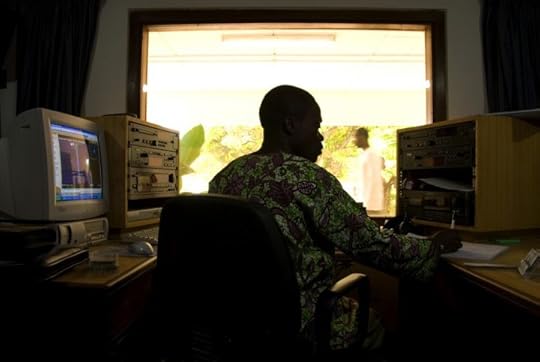
Radio technician. Ghana. Image credit Arne Hoel via The World Bank Flickr (CC).
This past week, my morning radio habit led me to a convoluted talk show on��Ghanaian radio station,��91.3FM,��that could have easily been mistaken for a call to arms against Nigerians in Ghana.��A guest��on the program��suggested Nigerians are responsible for a significant proportion of crimes committed in Ghana. In response, the host, following a feeble attempt to dissociate himself��from this��xenophobic sentiment, asked if the government ought not to monitor Nigerians in Ghana more closely, given our implied�����criminal tendencies.���
It left me equal parts infuriated, exasperated and��saddened at Ghanaian media��needlessly inflaming��public sentiment every time one misguided Nigerian of over 200 million dispersed��around��the world, commits a crime. Every. Single. Time.
The��latest incident��is the alleged orchestration between August and December 2018 of��the��kidnappings��of three young women by a man believed to be Nigerian in the city of��Takoradi��in Ghana���s Western Region. The kidnappings are among several other incidents occurring in a climate of arguably unprecedented violent crimes with the killings of at least three women���among them��a street hawker,��the��marketing and public affairs manager of the Ghana Ports and Harbors Authority, one��prominent pastor��and an��investigative journalist��since late 2018. Judging by comments on social and some news media, Nigerians have already been found guilty��of the kidnappings.
A representative of Nigeria���s ruling party even called in��to apologize on behalf of all Nigerians:�����I will apologize on the��[sic]��behalf of Nigerians for this unfortunate incident and we will also plead with our Ghanaian counterparts to understand that there is only going to be one Judas in every 12.���
I don’t know which is more upsetting: the inherent delusion that criminality is un-Ghanaian or the increasingly less tacit suggestion that Nigerians in Ghana should come under special scrutiny just because of our nationality. The first point conveniently overlooks the latent lapses in, with and between the security apparatuses in Nigeria and Ghana that allowed this monstrous kidnapper to reportedly break jail more than once in both countries. Not to mention the fact that��Mr�����Mastermind” cannot have imported an exclusively Nigerian team for what appears to be the Ghana franchise of his diabolical dealings.
“History is cyclical,” commented a friend when I first posted this on Facebook last week. And he is right to some extent. “Ghana Must Go,” Nigeria’s 1983 expulsion of Ghanaians, makes a handy reference. At then-president��Shehu��Shagari’s orders, over��two million immigrants��from��Ghana and surrounding countries were forcibly expelled, assaulted by Nigerian police as they left. Some would drown during treacherous sea crossings in overcrowded boats.
But this tragedy was��preceded by Ghana’s expulsion��in 1969 of some 200,000 ���foreigners��� under the Aliens Compliance Order of Kofi��Busia���s��government. Most of these people were Nigerian, deported because they were considered as economic threats to Ghanaians���a lopsided singular narrative about people who had contributed substantially to Ghana’s fortunes through legitimate commerce over many years. While there have been no further mass expulsions since 1969, there has been no end of finger-pointing and��demonizing��of Nigerians in Ghana by Ghanaians in ways that are unmatched by the experiences of Ghanaians in other African countries. Crimes in Ghana are readily attributed to Nigerians and some property owners��pointedly��refuse to rent to Nigerians.
My Facebook friend also suggested that inept political leaders��in both countries, like to scapegoat immigrants to camouflage their failings. Yet there is a��barely disguised��disdain for the people known as ���foreigners��� in Ghana. Especially if you’re Black. Critically if you happen to be Nigerian.
Clearly, this xenophobic stew has been cooking a long time. As living conditions continue to worsen for the ordinary Ghanaian,��it’s only a matter of time before it boils over as the tragic events in South Africa (where South Africans regularly attack other Africans) or C��te d���Ivoire (in the case of the latter, politicians built��political platforms on xenophobia) have taught us. When it does, given the cultural and other affinities between both countries, Nigerians will probably not be the only victims.
Sean Jacobs's Blog
- Sean Jacobs's profile
- 4 followers



